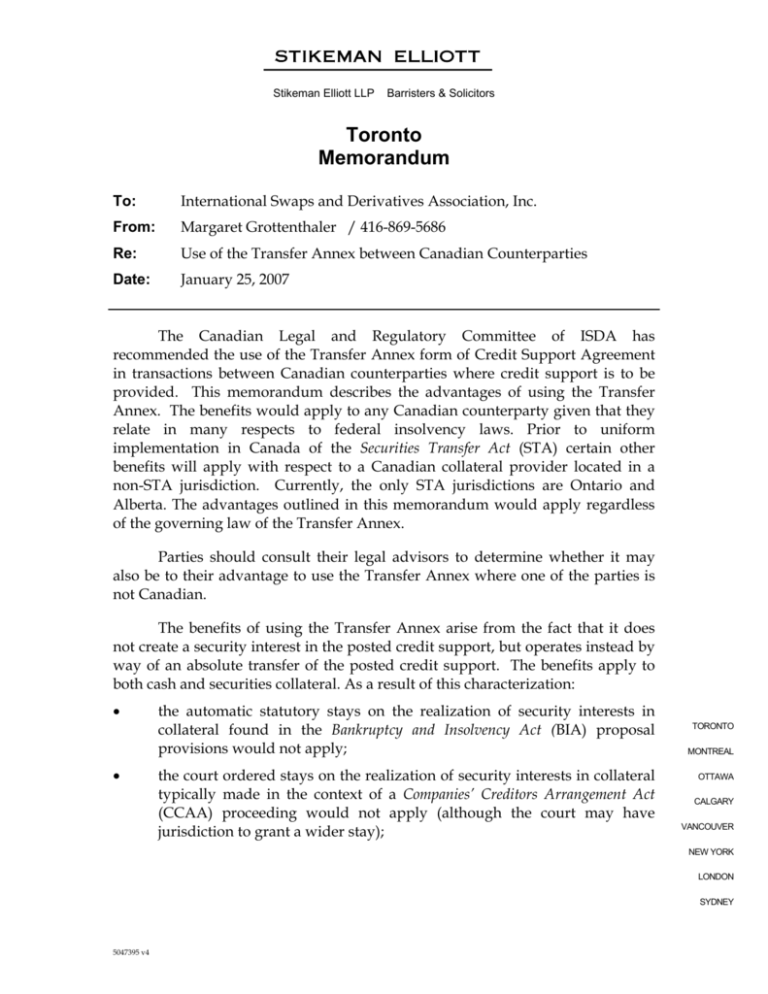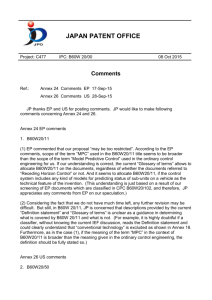Memorandum outlining the benefits of use of the Transfer Annex
advertisement

Stikeman Elliott LLP Barristers & Solicitors Toronto Memorandum To: International Swaps and Derivatives Association, Inc. From: Margaret Grottenthaler / 416-869-5686 Re: Use of the Transfer Annex between Canadian Counterparties Date: January 25, 2007 The Canadian Legal and Regulatory Committee of ISDA has recommended the use of the Transfer Annex form of Credit Support Agreement in transactions between Canadian counterparties where credit support is to be provided. This memorandum describes the advantages of using the Transfer Annex. The benefits would apply to any Canadian counterparty given that they relate in many respects to federal insolvency laws. Prior to uniform implementation in Canada of the Securities Transfer Act (STA) certain other benefits will apply with respect to a Canadian collateral provider located in a non-STA jurisdiction. Currently, the only STA jurisdictions are Ontario and Alberta. The advantages outlined in this memorandum would apply regardless of the governing law of the Transfer Annex. Parties should consult their legal advisors to determine whether it may also be to their advantage to use the Transfer Annex where one of the parties is not Canadian. The benefits of using the Transfer Annex arise from the fact that it does not create a security interest in the posted credit support, but operates instead by way of an absolute transfer of the posted credit support. The benefits apply to both cash and securities collateral. As a result of this characterization: • • the automatic statutory stays on the realization of security interests in collateral found in the Bankruptcy and Insolvency Act (BIA) proposal provisions would not apply; the court ordered stays on the realization of security interests in collateral typically made in the context of a Companies’ Creditors Arrangement Act (CCAA) proceeding would not apply (although the court may have jurisdiction to grant a wider stay); TORONTO MONTREAL OTTAWA CALGARY VANCOUVER NEW YORK LONDON SYDNEY 5047395 v4 2 • the court ordered stay that is a possibility under the BIA bankruptcy provisions or Winding-up and Restructuring Act (WURA) liquidation provisions would not apply; • the provisions in these insolvency statutes or other statutes that permit the court to make orders granting priority or which provide for an automatic priority to certain creditors over the claims of secured creditors would not apply; • the Personal Property Security Act (Ontario) (and other provincial PPSAs) would not apply to the transactions, meaning that o there would not be a need to rely on perfection of a security interest by filing a financing statement in the jurisdiction where the Transferor is located for those forms of collateral where filing is recommended (e.g. cash in STA jurisdictions or certain securities in non-STA jurisdictions); 1 o the limitations on rehypothecation of securities in non-STA jurisdictions would not apply; o the limits on realization (such as setting off the value of the collateral against the Termination Amount) would not apply. Each of these advantages is achievable only if the court accepts the characterization of the transfers as absolute transfers and that such absolute transfers do not in substance create a security interest. That characterization is not a certainty but is a reasonable possibility (as discussed in our memorandum to ISDA regarding the Credit Support Agreements). The possibility of achieving these advantages recommends the use of the Transfer Annex over the New York form of Credit Support Annex for transactions between Canadian Counterparties. While these same advantages would also apply with respect to crossborder transactions involving a Canadian counterparty, there are withholding tax issues that would have to be considered in that context. Using the Transfer Annex may not be feasible in all circumstances. Certain entities may face legal or internal constraints on using the Transfer Annex (eg. mutual funds subject to National Instrument 81-102). Also, this form of transfer may impact negative covenants differently than a security interest. We have considered the benefits of the Transfer Annex largely from the priority and insolvency perspective and parties should consider whether there are any 1 Transferees may nevertheless decide to file a financing statement to protect against recharacterization. 5047395 v4 3 reasons relating to their particular counterparty or circumstances that would recommend against use of the Transfer Annex. This memorandum is for information purposes only and is not to be relied on as legal advice. 5047395 v4






